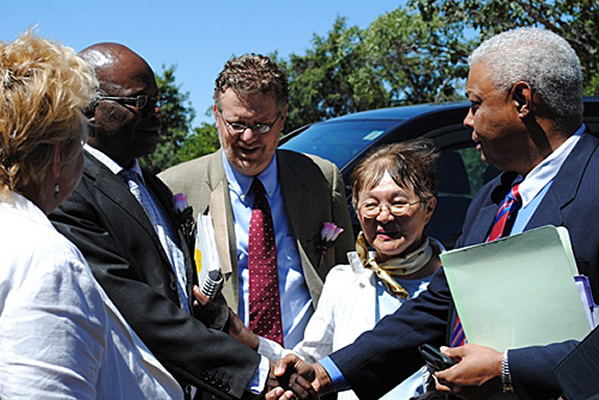Fay Chung pokes holes into Mugabe’s Look East Policy
By Sij Ncube
HARARE – FORMER cabinet minister Fay Chung has poked holes into President Robert Mugabe’s Look East Policy, saying solutions to Zimbabwe’s political and socio-economic problems squarely lie in “internal drivers” and not Chinese donations.

Chung, who served as minister of Education, Sports and Culture in the 1980s, Wednesday night officially, launched her book Zimbabwe Looking East. She previously headed the Curriculum Development Unit in the same ministry and was a freedom fighter in Zimbabwe’s war of liberation.
The book, which costs $10, provides a perspective of China’s economic policies and governing cultural ideology and how all these influencing factors determine how China relates to other nations such as the United States of America and Zimbabwe.
It also analyses Zimbabwe’s heritage and economic policies and unpacks the relationship between Zimbabwe and China through economic and ideological perspectives.
“Zimbabwe like many other African countries is highly donor dependant, suffering from the concept. We are too poor to refuse anything. This is a recipe for disaster,” reads part of Chung’s abstract of her book.
Mugabe adopted the Look East Policy at the turn of the millennium after the West slammed him together with his inner circle with targeted sanctions citing electoral fraud and gross human rights violations. His administration considers China as Zimbabwe’s all-weather friend and a panacea to the country’s economic problems.
In her book, launched at the Women’s University of Africa where she is a co-founder chairperson of the board of trustees, Chung says while Mugabe’s turning East was an emotional “gut instinct” response, “it also indicated political astuteness”, pointing out very few people in the world anticipated that China was the place to be after the financial crisis hit the West in 2008.
“Few in Africa and Zimbabwe recognised this trajectory,” says Chung, in praise of Mugabe’s alleged political astuteness.
But she is hard-hitting in analysing Mugabe’s political and socio-economic policies in relation to looking up to China. While China has pumped funds and provided farming implements to support Mugabe’s controversial land reforms, the agricultural revolution has produced a mixed bag, she says, pointing out that while about 400 000 new farms have been given farms compared to about 4000 former white commercial farmers, only about 22 000 have launched successful farming ventures.
“The Zimbabwean Look East political Policy has not been supported by more specific and realistic strategies,” says Chung.
She says for example China relied on its diaspora to initially open up industrialisation, investments and export markets. But Zimbabwe pays lip service to its more than 2 million people in the diaspora.
“Zimbabwe should formulate policies and strategies which will enable the diaspora to bring in their new management and industrial skills, in collaboration with the state. Assuming that 10 percent of them have managed to obtain relevant individual and economic knowledge, skills and experience and are also in a position to invest in their own country, they can play a key role in the industrial redevelopment of the country.”
She said China works closely with its private sector while this is not happening in Zimbabwe despite Harare’s much-trumpeted Look East policy. Chung says unless the Zimbabwe state works closely with the private sector, particularly its diaspora, it will find it difficult to move forward.
“Until and unless Zimbabwe uses what little resources it has more judiciously for developmental purposes rather than for short-term political support, it will fail to develop. It is totally unsound to expect development to come from the East or from the West. Development will come from internal drives,” says Chung. Radio VOP






